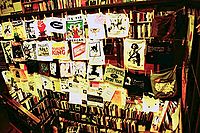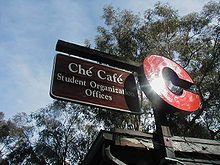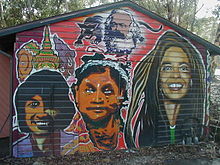- Ché Café
-
The Ché Café is a worker co-operative, social center, and live music venue located on the University of California, San Diego campus in La Jolla, California, USA.
History
Founded in 1980 by UCSD students, the Che originally began its life as a vegan cafe. The name "Che" in "Ché Café" is not only a nod to the late Argentine revolutionary Che Guevara, but it is also a backronym for "Cheap Healthy Eats". The latter name was registered with the university administration in an attempt to avoid political scrutiny.[citation needed]
During the 1980s, collective members began to host reggae and punk rock shows, and in the 1990s, the space became an internationally recognized staple of the hardcore/punk/post-punk/indie rock scene. Today, the Che operates primarily as a venue for a variety of musical genres, many based around the DIY ethic, and is an on-and-off again vegan cafe and catering operation. It also acts as a resource for the music and art departments on campus through hosting art shows, performances and film screenings. Some of the most notable touring bands or musicians who have played the Che include, City of Caterpillar, Green Day, Billy Corgan, Blonde Redhead, Jimmy Eat World, Deerhoof, Lightning Bolt, Black Dice, The Dillinger Escape Plan, Isis, Botch, Bright Eyes, Mike Watt, Hella, Sleep, Acid Mothers Temple, Animal Collective, Dan Deacon, Bon Iver, the Damo Suzuki Network, Unwound, and Jawbreaker. The Che has also played host to many, if not most, of San Diego's most influential and notable indie bands, including Drive Like Jehu, Gogogo Airheart, The Locust, Three Mile Pilot, Heavy Vegetable, The Album Leaf, Rob Crow, Cattle Decapitation, Antioch Arrow, Weatherbox, and The Plot to Blow Up the Eiffel Tower.
UCSD administration clashes
Despite the university's initial support for the co-ops at UCSD, the relationship between the university and student co-ops has been in decline, with recent improvements made through mediation since 2003. The Ché Café in particular has for a long time had a very strained relationship with the university, and as with the other co-ops, there have been numerous attempts made by the university to close the space.
In the spring of 2000, UCSD attempted to close the space by changing the locks without members' consent, resulting in a lock-in by members and supporters. The UCSD administration cited as motivation a fight which occurred between two patrons at a show in which one was injured (though there has been much discrepancy as to what actually took place). Following the lock-in, the university tried to force the Ché to hire security guards for every show, but it was later ruled that the university did not have such authority under the 1993 Memorandum of Understanding between the co-ops and the university.
In 2002, the Ché agreed to sponsor the BURN! collective's web project, which was previously sponsored by the co-op bookstore Groundwork Books. BURN! was a directory of radical websites, mailing lists, and resources. The BURN! directory included a link to the webpages of the Revolutionary Armed Forces of Colombia (FARC), a US State Department designated foreign terrorist organization. In 2004, the UCSD administration received a complaint about the link, accused the Ché Café core members of providing "material support" to the FARC in violation of the USA Patriot Act, and threatened disciplinary action. In arbitration, it was determined that the BURN! project was not hosting the FARC's website, simply linking to it, and so the University subsequently dropped its threats against the Ché core members.
External links
- Ché Café homepage
- CNET article about FARC linking controversy
- Slashdot story on the linking controversy
- San Diego Reader article about Ché Café history
University of California, San Diego
La Jolla, San Diego, CaliforniaResidential colleges 
Professional schools Jacobs School of Engineering · Graduate School of International Relations and Pacific Studies · Rady School of Management · School of Medicine · Skaggs School of PharmacyResearch institutes Scripps Institution of Oceanography · HPWREN · Calit2 · San Diego Supercomputer Center · UC San Diego Medical CenterAthletics Life The Guardian · The Koala · California Review · Price Center · Geisel Library · KSDT Radio · UCSD TV · Preuss School · UCSD Alumni Association · Ché Café · Sun God · Sun God Festival · JSOR Concert Series · Stuart CollectionInfoshops and Social centers Europe ASCII · Freedom Shop · Poortgebouw · Centre International de Recherches sur l'Anarchisme (CIRA) · OT301 · Seomra Spraoi · Can Masdeu · De Blauwe Aanslag · Blitz · Metelkova · Hirvitalo · Hausmania · Patio Maravillas · Ernst-Kirchweger-Haus · Ungdomshuset · Sosiaalikeskus Satama · UFFA · Ivar Matlaus · Kafé 44
United States A-Space · ABC No Rio · Bluestockings · Brian MacKenzie Infoshop · The Brick House · Catalyst Infoshop · Ché Café · Civic Media Center · Cream City Collectives · Firestorm cafe · Internationalist Books · Iron Rail Book Collective · Lucy Parsons Center · Red Emma's Bookstore Coffeehouse · Trumbullplex · Wooden Shoe BooksUnited Kingdom Cowley Club · Freedom Press · London Action Resource Centre · The 1 in 12 Club · The Forest · 491 Gallery · Sumac Centre · Former locations: BIT · Centro Iberico · rampARTCanada Asia Australia New Zealand Coordinates: 32°52′23″N 117°14′22″W / 32.872926°N 117.239335°W
Categories:- Music venues in California
- University of California, San Diego
- Social centres
- Worker cooperatives
Wikimedia Foundation. 2010.


